| Listing 1 - 10 of 10 |
Sort by
|
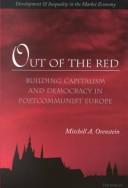
ISBN: 047206746X 0472097466 Year: 2004 Publisher: Ann Arbor, Mich. University of Michigan Press
Abstract | Keywords | Export | Availability | Bookmark
 Loading...
Loading...Choose an application
- Reference Manager
- EndNote
- RefWorks (Direct export to RefWorks)
Post-communism --- 330.342 --- 330.342 Economische ontwikkeling. Groeistadia --- Economische ontwikkeling. Groeistadia --- Postcommunism --- World politics --- Communism --- Czechoslovakia --- Czech Republic --- Poland --- Economic policy --- Politics and government --- Economic policy. --- Internal politics --- Economic policy and planning (general)
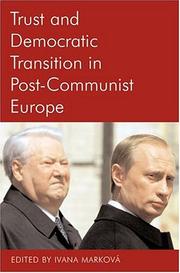
ISBN: 0197263135 Year: 2004 Volume: 123 Publisher: Oxford : Oxford University Press,
Abstract | Keywords | Export | Availability | Bookmark
 Loading...
Loading...Choose an application
- Reference Manager
- EndNote
- RefWorks (Direct export to RefWorks)
Democracy --- Post-communism --- Political sociology --- Démocratie --- Postcommunisme --- Sociologie politique --- Congresses --- Congrès --- Europe, Eastern --- Europe de l'Est --- Politics and government --- Politique et gouvernement --- Démocratie --- Congrès --- Trust --- Trust (Psychology) --- Attitude (Psychology) --- Emotions --- Postcommunism --- World politics --- Communism --- Mass political behavior --- Political behavior --- Political science --- Sociology --- Sociological aspects --- Europe --- Political sociology.
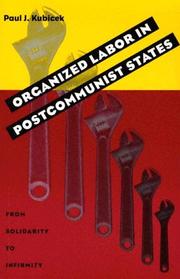
ISBN: 0822958562 1322068453 0822972670 9780822972679 Year: 2004 Publisher: Pittsburgh : University of Pittsburgh Press,
Abstract | Keywords | Export | Availability | Bookmark
 Loading...
Loading...Choose an application
- Reference Manager
- EndNote
- RefWorks (Direct export to RefWorks)
Labor unions --- Post-communism --- Syndicats --- Postcommunisme --- #SBIB:316.334.2A417 --- Arbeidssociologie: de vakbeweging in Oost-Europa --- E-books --- Postcommunism --- World politics --- Communism --- Industrial unions --- Labor, Organized --- Labor organizations --- Organized labor --- Trade-unions --- Unions, Labor --- Unions, Trade --- Working-men's associations --- Labor movement --- Societies --- Central labor councils --- Guilds --- Syndicalism --- Oost-Europa. --- GOS. --- Russland --- Polen --- Ungarn --- Ukraine --- Eastern Europe
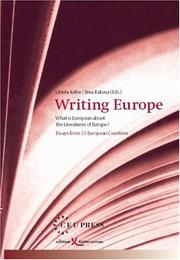
ISBN: 9786155053986 963924189X 9639241903 2821815212 9786611377106 1281377104 1429460660 6155053987 9789639241893 9781429460668 9789639241909 9782821815216 9781281377104 6611377107 Year: 2004 Publisher: Budapest, Hungary ; New York : Central European University Press,
Abstract | Keywords | Export | Availability | Bookmark
 Loading...
Loading...Choose an application
- Reference Manager
- EndNote
- RefWorks (Direct export to RefWorks)
Democracy thrives on social dialogue and collective search for solution. As a forum for new ideas and impulses the Körber-Foundation seeks with its projects to involve citizens actively in social discourses. The private, non-profit-making foundation provides a forum for involvement in politics, education, science and international communication. Citizens who take part in competitions and round table discussions organized by the foundation benefit in many ways: they can pass on knowledge, iden ...
European literature -- History and criticism. --- European literature --- History and criticism. --- Europe --- Council of Europe countries --- Eastern Hemisphere --- Eurasia --- Littérature européenne --- LITERARY CRITICISM / European / General. --- Histoire et critique. --- Central and Eastern Europe, Communism, Dictatorship, Fiction, Literature, Postcommunism. --- European authors --- literature --- centralism --- diversity --- European Union --- culture --- identity --- European countries
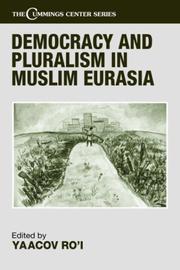
ISBN: 0714652253 0203009266 9780203009260 9780714652252 1135775761 1280059575 9781135775711 9781135775759 9781135775766 9781138967359 1135775753 Year: 2004 Volume: 19 Publisher: London ; New York : Frank Cass,
Abstract | Keywords | Export | Availability | Bookmark
 Loading...
Loading...Choose an application
- Reference Manager
- EndNote
- RefWorks (Direct export to RefWorks)
This book is devoted to the study and analysis of the prospects for democracy among the Muslim ethnicities of the Commonwealth of Independent States (CIS), both those that have acquired full independence and those remaining within the Russian Federation. The nineteen Western academics and scholars from the Muslim countries and regions of the CIS who contribute to this volume view the establishment of democratic institutions in this region in the context of a wide and complex range of influences, above all the Russian/Soviet political legacy; native ethnic political culture and tradition; the I
Democracy --- Muslims --- Post-communism --- Démocratie --- Musulmans --- Postcommunisme --- Asia, Central --- Caucasus, Northern (Russia) --- Asie centrale --- Ciscaucasie (Russie) --- Ethnic relations --- Ethnic relations. --- Relations interethniques --- Self-government --- Political science --- Equality --- Representative government and representation --- Republics --- Postcommunism --- World politics --- Communism --- Mohammedans --- Moors (People) --- Moslems --- Muhammadans --- Musalmans --- Mussalmans --- Mussulmans --- Mussulmen --- Religious adherents --- Islam
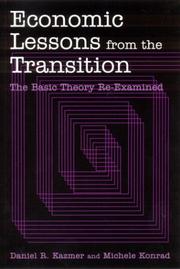
ISBN: 0765612984 0765612992 1315290057 9786610912292 1280912294 0765621967 1315290049 9780765621962 9781280912290 9780765612984 9781315290058 9781315290027 9781315290034 9780765612991 1315290030 Year: 2004 Publisher: Armonk, N.Y. Sharpe
Abstract | Keywords | Export | Availability | Bookmark
 Loading...
Loading...Choose an application
- Reference Manager
- EndNote
- RefWorks (Direct export to RefWorks)
This work focuses on major transitions in the 1990's: the transition from central planning and communism to market capitalism and the global integration of national financial systems.
Economic order --- Economics --- -Post-communism --- -330 --- Postcommunism --- World politics --- Communism --- Economic theory --- Political economy --- Social sciences --- Economic man --- Study and teaching --- Economic aspects --- Europe, Eastern --- Former Soviet republics --- -CIS countries --- Commonwealth of Independent States countries --- Ex-Soviet republics --- Ex-Soviet states --- Former Soviet states --- New Independent States (Former Soviet republics) --- Newly Independent States (Former Soviet republics) --- NIS (Former Soviet republics) --- East Europe --- Eastern Europe --- Economic conditions --- -Economic conditions --- Post-communism --- Study and teaching. --- Economic aspects. --- Economic conditions.
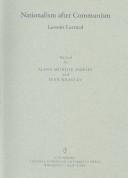
ISBN: 9639241768 Year: 2004 Publisher: New York, N.Y. : Central European University Press,
Abstract | Keywords | Export | Availability | Bookmark
 Loading...
Loading...Choose an application
- Reference Manager
- EndNote
- RefWorks (Direct export to RefWorks)
Nationalism --- Post-communism --- Nationalisme --- Postcommunisme --- Europe, Eastern --- Former Soviet republics --- Europe de l'Est --- Ex-URSS --- Ethnic relations --- Political aspects. --- Relations interethniques --- Aspect politique --- -Nationalism --- -Post-communism --- -Postcommunism --- World politics --- Communism --- Consciousness, National --- Identity, National --- National consciousness --- National identity --- International relations --- Patriotism --- Political science --- Autonomy and independence movements --- Internationalism --- Political messianism --- -CIS countries --- Commonwealth of Independent States countries --- Ex-Soviet republics --- Ex-Soviet states --- Former Soviet states --- New Independent States (Former Soviet republics) --- Newly Independent States (Former Soviet republics) --- NIS (Former Soviet republics) --- East Europe --- Eastern Europe --- -Political aspects. --- -Political aspects --- Political messianismEurope, Eastern --- Eastern EuropeEthnic relations --- -Europe, Eastern --- -Ethnic relations --- Republics --- CIS countries

ISBN: 0745624502 9780745624501 Year: 2004 Publisher: Cambridge: Polity press,
Abstract | Keywords | Export | Availability | Bookmark
 Loading...
Loading...Choose an application
- Reference Manager
- EndNote
- RefWorks (Direct export to RefWorks)
Post-communism --- Globalization --- Socialism --- Welfare state --- Right and left (Political science) --- sociale democratie --- internationalisering --- Post-communism. --- Derde weg --- Derde weg. --- #SBIB:013.IO --- #SBIB:321H60 --- #SBIB:324H20 --- Left (Political science) --- Left and right (Political science) --- Right (Political science) --- Political science --- State, Welfare --- Economic policy --- Public welfare --- Social policy --- State, The --- Welfare economics --- Marxism --- Social democracy --- Socialist movements --- Collectivism --- Anarchism --- Communism --- Critical theory --- Global cities --- Globalisation --- Internationalization --- International relations --- Anti-globalization movement --- Postcommunism --- World politics --- Westerse politieke en sociale theorieën vanaf de 19e eeuw: socialisme, marxisme, communisme, anarchisme --- Politologie: theorieën (democratie, comparatieve studieën….) --- integratie --- liberalisme --- Sociological theories --- globalisering --- instellingen --- Globalization. --- Right and left (Political science). --- Socialism. --- Welfare state.
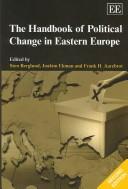
ISBN: 1840648546 Year: 2004 Publisher: Cheltenham Elgar
Abstract | Keywords | Export | Availability | Bookmark
 Loading...
Loading...Choose an application
- Reference Manager
- EndNote
- RefWorks (Direct export to RefWorks)
Social change --- Post-communism --- Europe, Eastern --- Social conditions --- Politics and government --- Postcommunisme --- -#SBIB:328H27 --- -306.0947 --- -Social change --- -Political systems --- Political systems --- Internal politics --- anno 1990-1999 --- Eastern and Central Europe --- Changement social --- Congresses --- Congrès --- Europe de l'Est --- Conditions sociales --- Politique et gouvernement --- -Post-communism --- Postcommunism --- Change, Social --- Cultural change --- Cultural transformation --- Societal change --- Socio-cultural change --- Instellingen en beleid: Midden- en Centraal Europa: algemeen --- East Europe --- Eastern Europe --- -Politics and government --- -Social conditions --- World politics --- Communism --- Social history --- Social evolution --- -Europe, Eastern --- -PAYS DE L'EUROPE DE L'EST --- POLITIQUE ET GOUVERNEMENT --- EUROPE DE L'EST --- 20E SIECLE --- EUROPE --- 1989 --- -Politique et gouvernement --- EUROPE DE L'EST20E SIECLE
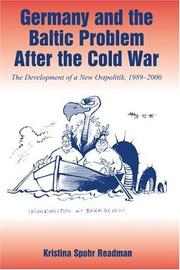
ISBN: 1280225610 9786610225613 0203489454 9780203489451 9781135770235 1135770239 9781135770181 1135770182 9781135770228 1135770220 9780714655154 0714655155 9780415647991 0415647991 Year: 2004 Publisher: London New York Routledge
Abstract | Keywords | Export | Availability | Bookmark
 Loading...
Loading...Choose an application
- Reference Manager
- EndNote
- RefWorks (Direct export to RefWorks)
The root question this book addresses is how the new Germany will use its re-found status as a great power. Does Germany - as in the past - aim to dominate Europe? Or has it renounced its imperial ambitions following the trauma of division during the Cold War?In seeking answers to these questions, Kristina Spohr Readman scrutinises the development of Germany's new Ostpolitik (eastern policy) in the period 1989-2000. Against the background of recent European history, she analyses the re-establishment of a special relationship between Bonn/Berlin and Moscow.
Post-communism --- Postcommunism --- World politics --- Communism --- Germany --- Baltic States --- Europe, Eastern --- East Europe --- Eastern Europe --- Baltic Republics --- Baltics (States) --- Alemania --- Ashkenaz --- BRD --- Bu̇gd Naĭramdakh German Uls --- Bundesrepublik Deutschland --- Deutsches Reich --- Deutschland --- Doitsu --- Doitsu Renpō Kyōwakoku --- Federal Republic of Germany --- Federalʹna Respublika Nimechchyny --- FRN --- German Uls --- Germania --- Germanii︠a︡ --- Germanyah --- Gjermani --- Grossdeutsches Reich --- Jirmānīya --- KhBNGU --- Kholboony Bu̇gd Naĭramdakh German Uls --- Nimechchyna --- Repoblika Federalin'i Alemana --- República de Alemania --- República Federal de Alemania --- Republika Federal Alemmana --- Vācijā --- Veĭmarskai︠a︡ Respublika --- Weimar Republic --- Weimarer Republik --- ХБНГУ --- Германия --- جرمانيا --- ドイツ --- ドイツ連邦共和国 --- ドイツ レンポウ キョウワコク --- Germany (East) --- Germany (Territory under Allied occupation, 1945-1955) --- Germany (Territory under Allied occupation, 1945-1955 : British Zone) --- Germany (Territory under Allied occupation, 1945-1955 : French Zone) --- Germany (Territory under Allied occupation, 1945-1955 : Russian Zone) --- Germany (Territory under Allied occupation, 1945-1955 : U.S. Zone) --- Germany (West) --- Holy Roman Empire --- Foreign relations --- Deguo --- 德国 --- Gėrman --- Герман Улс
| Listing 1 - 10 of 10 |
Sort by
|

 Search
Search Feedback
Feedback About UniCat
About UniCat  Help
Help News
News